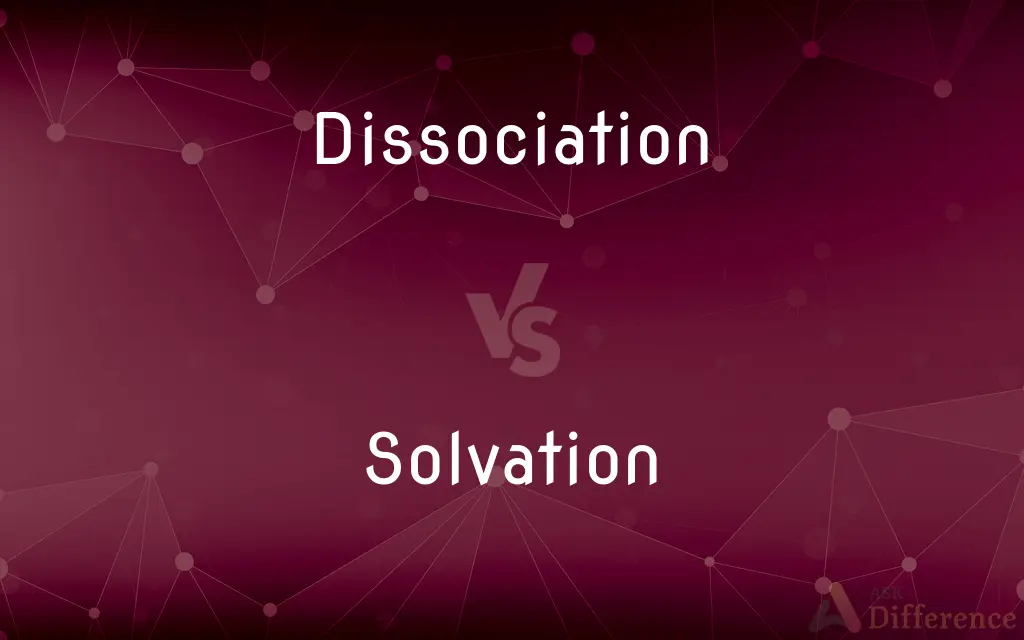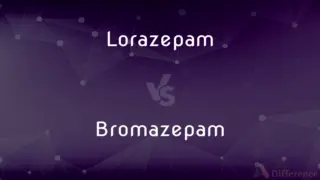Dissociation vs. Solvation — What's the Difference?
By Maham Liaqat & Urooj Arif — Updated on April 23, 2024
Dissociation involves the separation of molecules into smaller entities, typically ions, whereas solvation describes the interaction of solvent molecules with solute ions or molecules.

Difference Between Dissociation and Solvation
Table of Contents
ADVERTISEMENT
Key Differences
Dissociation refers to the process where molecules such as acids, bases, or salts break down into ions when dissolved in a solvent. This process is crucial in chemical reactions involving ionic compounds. On the other hand, solvation involves solvent molecules surrounding and interacting with the dissociated ions, stabilizing them in solution and affecting their behavior and properties.
Dissociation can occur in various solvents but is most commonly observed in polar solvents like water, which facilitate the breakup of molecular bonds through their electric fields. Whereas solvation specifically involves the direct interaction of solvent molecules, which can be polar or non-polar, with the ions or molecules from the dissociated solute.
The efficiency of dissociation is often measured by the degree to which the compound separates into ions. On the other hand, the effectiveness of solvation is gauged by how well the solvent molecules can stabilize these ions, which influences properties like solubility and conductivity.
In dissociation, the nature of the solute plays a critical role in determining whether and how completely it will dissociate. Conversely, in solvation, the chemical characteristics of the solvent are equally important, as they determine the solvent’s ability to interact with various solutes.
Dissociation is a fundamental step for many biological and chemical processes, such as the conducting of electrical currents in bodily fluids. Solvation, however, is essential for processes like the transport of nutrients and minerals in biological systems, as it affects the mobility and bioavailability of molecules.
ADVERTISEMENT
Comparison Chart
Definition
Separation of a compound into ions in a solvent
Interaction of solvent molecules with solute ions
Dependency
Depends on the nature of the solute
Depends on the nature of the solvent
Solvent type
Commonly occurs in polar solvents
Can occur in both polar and non-polar solvents
Role in solutions
Provides ions for chemical reactions
Stabilizes ions, affects solubility and conductivity
Measurement
Measured by degree of separation into ions
Measured by ability to stabilize ions
Compare with Definitions
Dissociation
The process where complex molecules break down into simpler particles such as ions or radicals.
Table salt (NaCl) dissociates into sodium and chloride ions in water.
Solvation
The process of solute particles being surrounded by solvent molecules.
Sugar crystals solvate when dissolved in water, becoming surrounded by water molecules.
Dissociation
A reaction where a molecule loses or gains a small unit.
Water dissociates into hydroxide and hydrogen ions under certain conditions.
Solvation
Influences physical properties of solutions such as conductivity and viscosity.
Solvation affects electrolyte solutions' conductivity.
Dissociation
The separation of particles in a mixture, particularly in spectroscopy or chromatography.
Dissociation of pigments in paper chromatography.
Solvation
The interaction between a solvent and the ions of a solute.
Ionic solvation occurs when salt dissolves in water.
Dissociation
In biochemistry, the reversible unfolding of protein or nucleic acid complexes.
DNA dissociation during replication.
Solvation
A key step in the formation of solutions in chemistry.
Solvation is necessary for the proper mixing of polar substances.
Dissociation
In psychology, a coping mechanism where thoughts are separated from feelings or memories.
Dissociation during traumatic events can help manage stress.
Solvation
A critical factor in the stabilization of ions in a solution.
Ammonia solvation by water involves the formation of hydrogen bonds.
Dissociation
The act of dissociating or the condition of having been dissociated.
Solvation
Solvation (or dissolution) describes the interaction of solvent with dissolved molecules. Both ionized and uncharged molecules interact strongly with solvent, and the strength and nature of this interaction influence many properties of the solute, including solubility, reactivity, and color, as well as influencing the properties of the solvent such as the viscosity and density.
Dissociation
The process by which the action of a solvent or a change in physical condition, as in pressure or temperature, causes a molecule to split into simpler groups of atoms, single atoms, or ions.
Solvation
Any of a class of chemical reactions in which solute and solvent molecules combine with relatively weak covalent bonds; the process of forming a solution or dispersion.
Dissociation
The separation of an electrolyte into ions of opposite charge.
Solvation
(chemistry) An association, or a reaction, of a solute with a solvent
Dissociation
(Psychiatry) A disintegration or fragmentation of the mind in which memories, thoughts, or aspects of the personality become disconnected, as in multiple personality disorder or some kinds of amnesia.
Solvation
A chemical process in which solvent molecules and molecules or ions of the solute combine to form a compound
Dissociation
The act of dissociating or disuniting; a state of separation; disunion.
Dissociation
(chemistry) The process by which a compound body breaks up into simpler constituents; said particularly of the action of heat on gaseous or volatile substances.
The dissociation of the sulphur molecules
The dissociation of ammonium chloride into hydrochloric acid and ammonia
Transform into real sentences
Dissociation
(psychology) A defence mechanism where certain thoughts or mental processes are compartmentalised in order to avoid emotional stress to the conscious mind.
Dissociation
(psychology) Feeling of detachment from reality
Dissociation
The act of dissociating or disuniting; a state of separation; disunion.
It will add infinitely dissociation, distraction, and confusion of these confederate republics.
Dissociation
The process by which a compound body breaks up into simpler constituents; - said particularly of the action of heat on gaseous or volatile substances; as, the dissociation of the sulphur molecules; the dissociation of ammonium chloride into hydrochloric acid and ammonia.
Dissociation
The act of removing from association
Dissociation
A state in which some integrated part of a person's life becomes separated from the rest of the personality and functions independently
Dissociation
(chemistry) the temporary or reversible process in which a molecule or ion is broken down into smaller molecules or ions
Common Curiosities
Is solvation always necessary for a solution to form?
While solvation is not always necessary for a solution to form, it significantly influences the stability, solubility, and properties of the solution.
How do ionic and covalent compounds differ in terms of dissociation?
Ionic compounds dissociate into ions when dissolved, whereas covalent compounds may not dissociate but can interact with solvents through solvation.
What role does temperature play in dissociation and solvation?
Temperature can increase the rate of dissociation by providing energy to break bonds, while it can also enhance solvation by increasing solvent molecule movement and interaction with solute.
Does solvation affect pH of a solution?
Solvation itself does not change the pH; however, the ions formed from solvation can influence the pH of the solution.
What does solvation mean in simple terms?
Solvation is the process where solvent molecules surround and interact with dissolved solute particles, typically ions.
What is dissociation in chemistry?
Dissociation in chemistry refers to the process where molecules break down into smaller ions or radicals when dissolved in a solvent.
How does dissociation differ from solvation in their reliance on solvent type?
Dissociation primarily occurs in polar solvents that facilitate the breakdown of bonds, while solvation can occur in both polar and non-polar solvents, depending on the nature of the solute and solvent.
Can dissociation occur without solvation?
Dissociation can occur without solvation, especially in gas phase reactions where solvent molecules are not present.
What are the effects of solvation on solute properties?
Solvation stabilizes solute ions and can change physical properties like solubility, boiling point, and electrical conductivity of the solution.
How does dissociation influence chemical equilibrium?
Dissociation affects chemical equilibrium by altering the concentration of reactants and products in a chemical reaction.
Can solvation occur with gases?
Yes, solvation can occur with gases, especially when they dissolve in liquids, such as carbon dioxide in water.
What is the significance of solvation in biological systems?
Solvation is crucial in biological systems as it assists in nutrient transport and cellular interactions by stabilizing ions and molecules.
What is meant by the degree of dissociation?
The degree of dissociation refers to the extent to which a compound separates into ions or radicals in a solution.
What is a solvent cage in the context of solvation?
A solvent cage is a clustering of solvent molecules around a solute particle, effectively isolating it from other solute particles.
Are all solutes equally capable of being solvated?
Not all solutes are equally capable of being solvated; the extent of solvation depends on the chemical nature of the solute and the solvent.
Share Your Discovery

Previous Comparison
Lorazepam vs. Bromazepam
Next Comparison
Investigate vs. ExploreAuthor Spotlight
Written by
Maham LiaqatCo-written by
Urooj ArifUrooj is a skilled content writer at Ask Difference, known for her exceptional ability to simplify complex topics into engaging and informative content. With a passion for research and a flair for clear, concise writing, she consistently delivers articles that resonate with our diverse audience.
















































